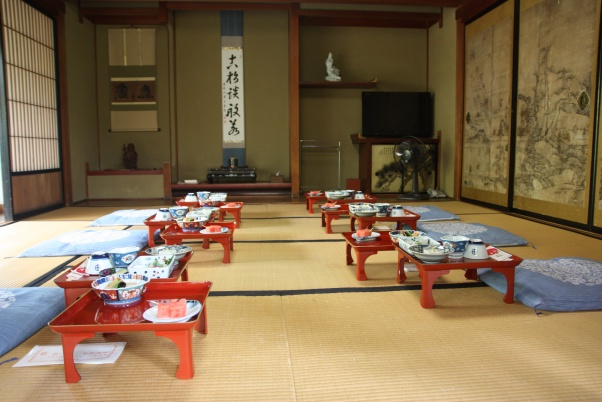Travelling Through Japan

When travelling to Japan I have the following tips:
Safety - Japan is such a safe place to travel with little or no crime. It is very safe to travel day or night on public transport.
Eating Out - Eating is not expensive in Japan contrary to popular belief. The train stations and department stores are a fantastic place to find reasonably priced food and drink. The train stations are massive with many floors, a bit like a department store. Traditional Japanese Meal - You have to try a traditional Japanese meal served on little tables on the tatami straw floor matting. You need to be able to sit on the floor and eat, which may not be so good if you have bad knees!
Drinking - You can drink tap water in Japan.
Transportation - Local transport runs exactly to schedule especially trains. The train system in Japan is second to none and very easy to use. All of the railway stations have signs in English as well as Japanese. When travelling on the local trains/subways in Tokyo or any other city for that matter and you are unsure of the cost of the sector, purchase the cheapest ticket and then at the end of your journey pay the difference at the “Fare Adjustment Counter”. If you are travelling around Japan via rail, it is best to get a JR Rail Pass, which works out cheaper and is very easy to use.
Baggage - You need not travel with heavy and cumbersome suitcases...use the takkyubin (luggage transfer service) from/to major cities...approximate cost $20.00 per medium suitcase and extremely reliable. Your hotel concierge can arrange this for you.
Tipping - Tipping is not necessary in Japan.
Accommodation - There are many western hotels in Japan but you can also stay at the traditional Japanese Inns called Ryokans. When staying at a Ryokan, you stay in a large guest room with tatami straw floor matting. Always take your shoes off when walking on the floor. Your bedding is stored in the closet and is laid out by the maid after dinner. Ryokans generally have communal bathrooms with separate areas for men and women.
Language - Japanese is the traditional language however English is widely spoken, making asking for directions easy.
Currency - The unit of currency in Japan is the Yen. It is advisable to carry cash in small denominations as sometimes you need to exact money to buy bus/train tickets etc. Some smaller shops do not accept credit cards, but the major ones do. ATMS are readily available in the cities but may not be in smaller country towns, so it is advisable to carry cash.
Etiquette - Japanese people are extremely polite. You must never blow your nose in public, put Soy Sauce on your rice or place your chop sticks in your bowl. Lastly, bow and say thank you.
